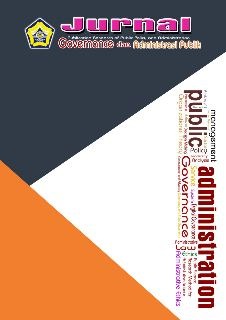Main Article Content
Abstract
Keywords
Article Details
Copyright :
Authors who publish their manuscripts in this Journal agree to the following conditions:
Copyright in each article is the property of the author.
The author acknowledges that Journal of Governance and Public Administration has the right to publish for the first time with a Creative Commons Attribution 4.0 International License.
The author can enter the writing separately, regulate the non-exculsive distribution of manuscripts that have been published in this journal into other versions (for example: sent to the author's institution respository, publication into books, etc.), by acknowledging that the manuscript was first published in the Journal Governance and Public Administration;
Licence :
The Journal of Governance and Public Administration is published under the terms of the Creative Commons Attribution 4.0 International License. This license allows anyone to copy and redistribute this material in any form or format, compose, modify, and make derivatives of this material for any purpose, including commercial interests, as long as they attach credit to the Author for the original creation.
References
- Hermana, M. Arafat. 2012. Kajian Terhadap Sengketa Tapal Batas Antara Kabupaten Bengkulu Utara Dan Kabupaten Lebong Dalam Perspektif Hukum Tata Negara. Thesis, Fakultas Hukum UNIB.
- Hermana, M. Arafat. 2015. Hambatan Penyelesaian Sengketa Tapal Batas Antara Kabupaten Bengkulu Utara dengan Kabupaten Lebong berdasarkan Hukum Administrasi Negara/Hukum Ketatanegaraan. Jurnal Hukum Sehasen Vol.1 No.1 Tahun 2015.
- Huberman , Miles B . dan M. H. (1992). Analisis data Kualitatif. (diterjemahkan Ole: Tjetjep Rohedi Rosidi). Jakarta: Universitas Indonesia.
- Moleong, Lexy J (2005). Metodologi Penelitian Kualitatif. Bandung: Remaja Rosdakarya.
- Rakhmat, Jalaluddin. 2004. Psikologi Komunikasi. Bandung: Remaja Rosdakarya
- Sutopo, H. B. 2002. Metodologi penelitian kualitatif, Dasar Teori dan Terapannya dalam Penelitian. Surakarta : Sebelas Maret university press.
- Undang-Undang Nomor 32 Tahun 2004 Tentang Pemerintah Daerah
- Undang-Undang Nomor 39 tahun 2003 tentang Pemekaran Kabupaten Lebong Dan Kepahiang
References
Hermana, M. Arafat. 2012. Kajian Terhadap Sengketa Tapal Batas Antara Kabupaten Bengkulu Utara Dan Kabupaten Lebong Dalam Perspektif Hukum Tata Negara. Thesis, Fakultas Hukum UNIB.
Hermana, M. Arafat. 2015. Hambatan Penyelesaian Sengketa Tapal Batas Antara Kabupaten Bengkulu Utara dengan Kabupaten Lebong berdasarkan Hukum Administrasi Negara/Hukum Ketatanegaraan. Jurnal Hukum Sehasen Vol.1 No.1 Tahun 2015.
Huberman , Miles B . dan M. H. (1992). Analisis data Kualitatif. (diterjemahkan Ole: Tjetjep Rohedi Rosidi). Jakarta: Universitas Indonesia.
Moleong, Lexy J (2005). Metodologi Penelitian Kualitatif. Bandung: Remaja Rosdakarya.
Rakhmat, Jalaluddin. 2004. Psikologi Komunikasi. Bandung: Remaja Rosdakarya
Sutopo, H. B. 2002. Metodologi penelitian kualitatif, Dasar Teori dan Terapannya dalam Penelitian. Surakarta : Sebelas Maret university press.
Undang-Undang Nomor 32 Tahun 2004 Tentang Pemerintah Daerah
Undang-Undang Nomor 39 tahun 2003 tentang Pemekaran Kabupaten Lebong Dan Kepahiang
